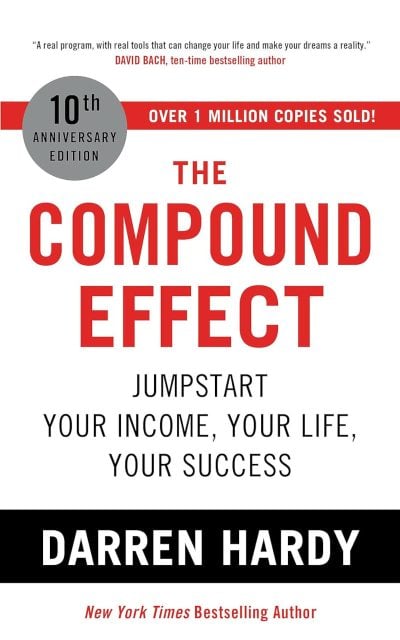

Each of us desires a fulfilling career, flexibility in terms of job and work schedule, or a leading position. Books on professional development and career development can help you achieve this.
This article presents some of the best of these books through short reviews.
The 7 Habits of Highly Effective People: Powerful Lessons in Personal Change
by Stephen R. Covey
This book is not about seven quickly implementable "insider tips" for working more effectively. Instead, it is about holistic, profound, and timeless principles for the development of one's personality. Many areas of life are covered: from work to social context to family life.
This book is an absolute classic in the field of self-development – one of the books that everyone should have read at least once. The seven principles are even explained on Wikipedia.
Of course, it is better to read (or listen to) the whole book! I recommend it to everyone – no matter if programmer, entrepreneur, or family member. The seven habits are not limited to specific groups of people but are suitable for all people who want to work on themselves and become a better person.
Suitable as an audio book? Yes, absolutely, and it is read by the author himself.
Give and Take: Why Helping Others Drives Our Success
by Adam Grant
Success depends not only on talent, passion, and hard work but also on how we treat our fellow human beings – friends and colleagues as well as competitors and opponents.
Science distinguishes three basic types of social behavior: Givers help others without expecting anything in return. Matchers strive to balance giving and receiving. Takers enrich themselves at the expense of others.
Adam Grant, a professor at Wharton Business School, has studied the long-term effects of these behaviors on careers and success. In this book, he presents his surprising result:
Both the most successful and the most unsuccessful people are givers.
How does this happen? If you are helpful and generous as a giver, but at the same time do not allow yourself to be taken advantage of and consistently pursue your goals, you will have greater long-term success than matchers and takers. However, if you thoughtlessly sacrifice yourself for others, you quickly become a "doormat" and lose strength and motivation.
The book is entertaining, based on extensive scientific studies, and filled with compelling current and historical stories from sports and business.
It is motivating to see that one can also be successful with decency, attention, and responsibility and for the benefit of others – and that egoists lose out in the long run.
Suitable as an audiobook? Yes!
Range: How Generalists Triumph in a Specialized World
by David Epstein
Most people believe that world-class success, such as mastering a musical instrument or in a professional sports career, is based on early specialization – preferably in childhood – and years of intensive training. Those who start too late should never be able to catch up with others.
David Epstein has studied professional athletes, Nobel Prize winners, and the most successful inventors and artists from the past and present. His surprising finding:
Most top performers were and are generalists who experimented with many different things. They took the path that ultimately led them to success quite late in life (in their late teens at the earliest, some even decades later).
Therefore, the safest path to success is through many detours and a wide range of interests and accumulated experiences. These allow generalists to look at challenges from different perspectives, make connections to areas outside their field, and thus come up with more creative solutions than their specialized colleagues.
The book is enjoyable and easy to read. The author explains his research findings clearly and complements them with fascinating stories of historical and contemporary figures.
A reassuring recommendation for anyone thinking about a career change – and for despairing parents whose children still haven't decided what they want to become or dare considering a shift in training place or field of study.
Suitable as an audiobook? Yes!
So Good They Can't Ignore You: Why Skills Trump Passion in the Quest for Work You Love
by Cal Newport
Not passion should be the driving force in career planning, but the opportunity and the will to constantly develop one's skills – passion will then come all by itself. At least this is Cal Newport's central thesis in "So Good They Can't Ignore You".
Newport calls the skills acquired over time – especially through "deliberate practice" (see Peak: Secrets from the New Science of Expertise by K. Anders Ericsson) – "career capital." Without rare and valuable skills, he says, there is virtually no chance of finding a job that rewards you with self-determination, success, and recognition.
And only when you've reached the top – through countless small steps (and setbacks) – when you've mastered your field – will you find compelling life missions in the "adjacent possible".
As alleged evidence for this fascinating thesis, the author provides numerous examples of successful dream careers – of authors, musicians, scientists, and managers. These are not convincing proofs, though, as no statistics show that there are not at least as many (or even more) counter-examples.
In me, the author would have found one. I worked in various management positions for two decades and became neither successful nor happy with them. It wasn't until I refocused on my passion, programming, that I became more successful and happier than ever. But who knows – maybe that was only possible because I had accumulated enough career capital.
I can't advise anyone to follow the book's approach unreflectively. The same goes for the certainly more widespread "Follow your Passion" guides.
Nevertheless, the reading is rewarding: You'll learn about a radically different approach to career development that will enable you to face life-defining decisions more consciously.
Suitable as an audiobook? Yes.
Originals: How Non-Conformists Move the World
by Adam Grant
Non-conformists ("originals") are people who challenge the status quo and bring about profound changes in society and science with innovative ideas.
Adam Grant has studied what makes originals tick, how they successfully run businesses, and how parents and teachers can foster creativity in their protégés.
In this book, you'll learn how to identify and develop good ideas while minimizing the risk of discarding good ideas ("false negatives") and pursuing bad ideas ("false positives").
You'll learn how to convince others of your ideas and gain allies, why procrastination often leads to the most successful innovations, and why the first mover doesn't always win.
The book describes how to foster creativity in others and groups and how the most successful companies welcome dissenters to create a culture of diversity and creativity.
Grant illustrates his findings with numerous studies, examples, and anecdotes from politics, business, and entertainment.
The book is inspiring, always surprising and a recommendation for all those who want to achieve great things with their ideas.
Suitable as an audiobook? Yes!
Peak: Secrets from the New Science of Expertise
by K. Anders Ericsson
Psychologist K. Anders Ericsson spent decades researching what distinguishes experts who achieve top performance in fields such as sports, chess, music, and science from their less successful counterparts.
The surprising result: Outstanding performance is not due to innate talent but rather the result of years of intensive and deliberate practice.
Practice does not mean repeating a learned activity for years. At some point, people reach a performance plateau from which they can no longer make further progress on their own. Many will recognize this from ten-finger typing: Once you've learned it satisfactorily, you don't get faster – even after decades of typing.
To push the limits of your abilities, you have to get out of your comfort zone. You must set ambitious goals, work out a path to get there (preferably with an experienced coach), and monitor and analyze your learning progress.
To achieve peak performance, several thousand hours of deliberate practice are necessary (it doesn't have to be precisely 10,000 – that number is just often quoted because it's so nicely round).
The author uses numerous examples to show that people can achieve anything in this way and at any age. They can become chess grandmasters, professional musicians with absolute pitch (which was previously thought to be innate), golf professionals, memory artists, or karate masters.
Even if you don't want to become an expert, you can still improve through deliberate practice. For example, at work, you should get regular feedback, not just once a year from your boss, but regularly and also from colleagues, for instance, after giving a talk, preparing a presentation, or moderating a meeting.
"Peak" is a fascinating book based on decades of scientific work. Nevertheless, it is enjoyable to read and a recommendation for all who want to develop themselves – in whatever field.
Suitable as an audiobook? Yes.
The Compound Effect: Jumpstart Your Income, Your Life, Your Success
by Darren Hardy
Darren Hardy, motivational coach and former editor of “Success” magazine, has identified the compound effect as the most significant factor for lasting success in all areas of life.
Small, at first glance insignificant, incremental changes in our everyday lives can lead to extraordinary results – professionally, financially, and in our private lives – if we maintain them consistently and over time.
On the one hand, the right mindset is essential: the attitude that no one but ourselves is responsible for our situation, that only we can improve our situation, and that patience and discipline are more rewarding than instant gratification.
Secondly, we need practical strategies to eliminate dysfunctional behaviors, adopt functional behaviors, and maintain these changes in the long term. For example, we can set long-term goals, check daily whether our actions are congruent with our goals, isolate ourselves from the omnipresent negativity of the media, and consume positive, inspiring content instead.
The book is easy to read, practical, and entertaining thanks to numerous concrete examples and anecdotes, and it motivates you to get involved with action plans at the end of each chapter. A recommendation for anyone who wants to change their life for the better.
Suitable as an audiobook? Yes.
How to Fail at Almost Everything and Still Win Big: Kind of the Story of My Life
by Scott Adams
In this guide, Scott Adams recounts how he went from dissatisfied office worker, through many failures, to finally become the creator of Dilbert, one of the world's most famous comics. He attributes this success to his following attitude to life:
1. Proper nutrition and exercise come first; both lead to more energy, productivity, and creativity.
2. Success is, first and foremost, luck. You cannot directly influence luck; however, through your actions, you can actively improve the chances of luck finding you.
3. Goals are for losers, and systems make you a winner. Goals (e.g., "I want to lose 20 pounds") can be so far away that you give up before you reach them. Systems ("I eat healthy food and exercise regularly") have no deadlines, can be pursued regularly, and make you happy whenever you apply them.
The author does not leave it at these abstract paraphrases but explains how he develops his systems and how you, as a reader, can set up your own. His trick is to imagine himself as a biological robot that a) has to be filled with proper input (healthy food leads to energy, positive thinking to good mood), and b) can be reprogrammed (e.g., to prefer healthy food over unhealthy food).
I recommend this book to anyone who doesn't want to read the same self-help guides over and over again, but one that partly contradicts traditional knowledge and that "ordinary" people who work 40 hours a week, who have families, can apply.
Suitable as an audiobook? Yes, but I’ve read the printed version and therefore cannot judge the audiobook edition.








